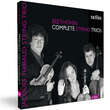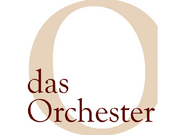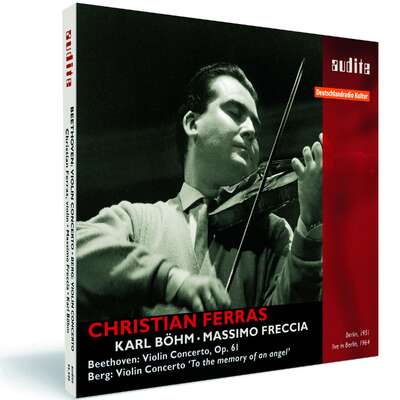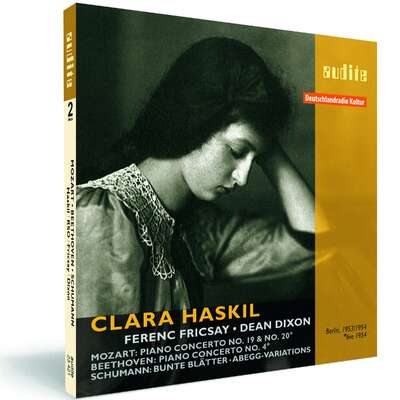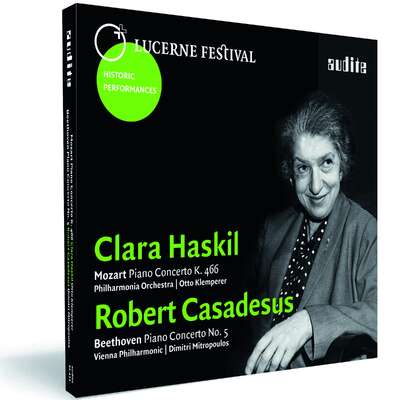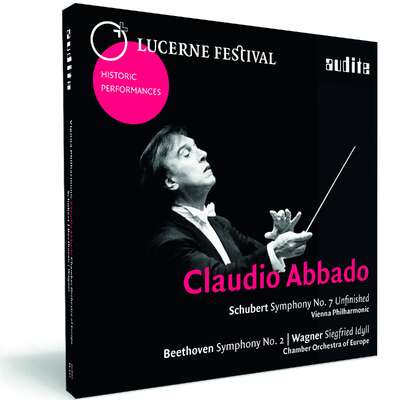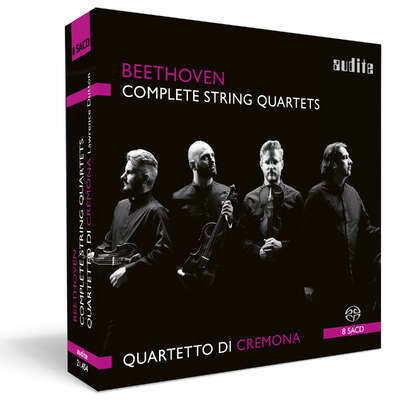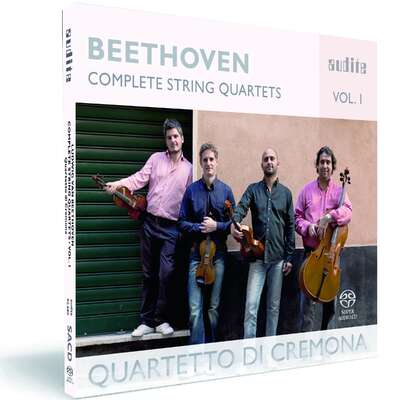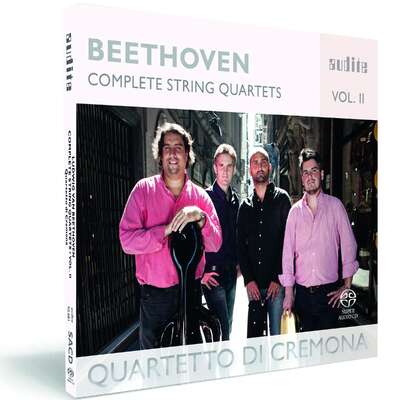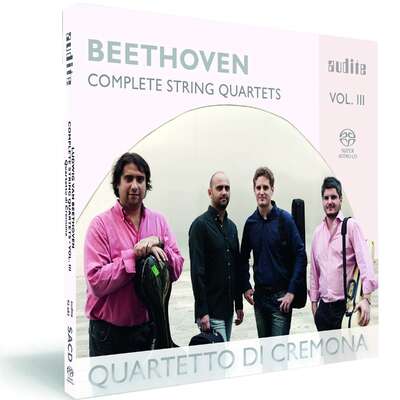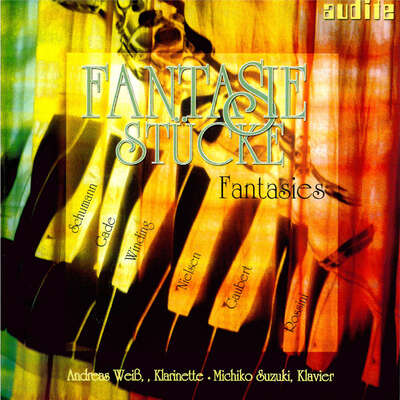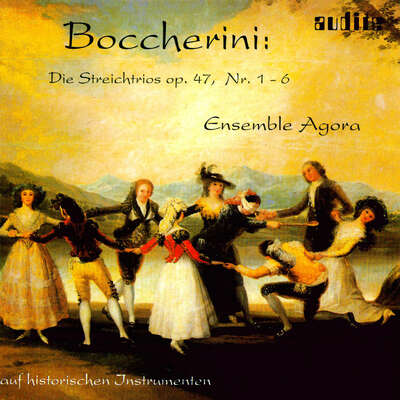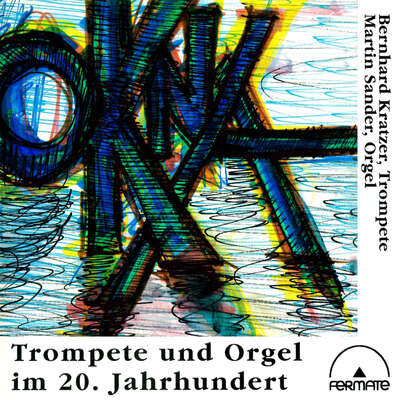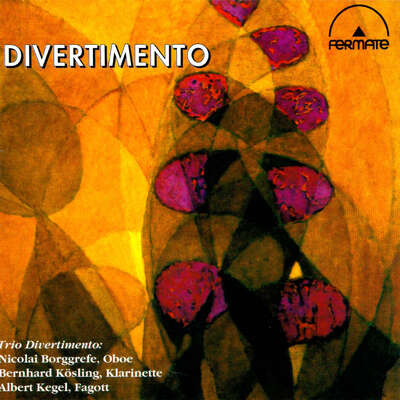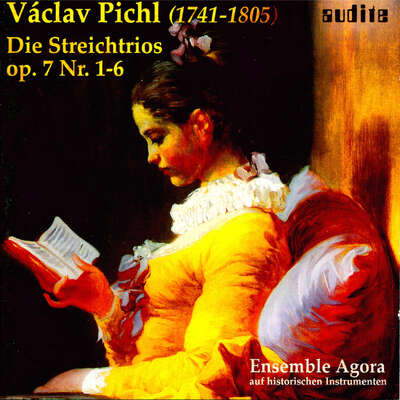
The five String Trios are masterpieces of the young Ludwig van Beethoven as he travels towards the string quartet: however, many musicians and scholars have preferred the mature Trios Op. 9 to the subsequent String Quartets Op. 18. With their new double CD, the Thibaud Trio provide an opportunity to rediscover these milestones in the history of the string trio.more
The five String Trios are masterpieces of the young Ludwig van Beethoven as he travels towards the string quartet: however, many musicians and scholars have preferred the mature Trios Op. 9 to the subsequent String Quartets Op. 18. With their new double CD, the Thibaud Trio provide an opportunity to rediscover these milestones in the history of the string trio.
Track List
Details
| Ludwig van Beethoven: Complete String Trios Op. 3, 8 & 9 | |
| article number: | 23.430 |
|---|---|
| EAN barcode: | 4022143234308 |
| price group: | BCE |
| release date: | 4. September 2015 |
| total time: | 145 min. |
Bonus Material
Informationen
Following the successful release of String Trios by Cras, Reger, Dohnányi and Kodály (aud. 97.534), the Jacques Thibaud String Trio are now turning towards a Classical composer, with a new audite complete recording of the Beethoven String Trios. It is not always clear why certain genres make it into the pantheon of musical history, whilst others remain "insiders' tips". The string quartet undoubtedly belongs to the former category, whilst the string trio - despite brilliant works such as Mozart's Divertimento K563 or the Beethoven String Trios - forms part of the latter. The trio formation consisting of a violin, viola and cello is generally deemed to produce a thin sound and to have been neglected by composers. With Beethoven, however, the opposite is true: for the young Beethoven, the trio was a touchstone of his mastery of this form "without piano", in which he found himself as a composer. He left five trios in all, in Opp. 3 and 8 turning towards the traditions of the divertimento and the serenade, whilst producing new and sophisticated reinterpretations of these forms. His Trios Op. 9, written in 1796-98, became his calling card as a composer for string instruments. All the characteristics of the mature Beethoven can be found here: astonishing sonorities; a sense of the character and personalities of the three instruments; using few, concise themes; drama and sensuousness.
Reviews
American Record Guide | March / April 2016 | Althouse | March 1, 2016
Beethoven’s five works for string trio were all written before his Op. 18 Quartets, so many commentators have seen them as preparatory works for theMehr lesen
The Thibaud Trio, named for the legendary French violinist, was founded in 1994, though violinist Burkhard Maiss is the only original player still with the group. His colleagues are violist Hannah Strijbos and cellist Bogdan Jianu. An earlier Thibaud Trio (different violist) recorded the Op. 9 trios more than a decade ago (J/F 2005). These performances are very fast in the quicker movements (and faster than the earlier Op. 9) with wonderfully nimble passagework from violinist Maiss. Slow movements are nice as well, with no sense of impatience. Their extroverted playing is tempered by lovely soft playing, e.g. in the minuet to Op. 9:2. A delightful release, then, worthy to join earlier recommended recordings by the Leopold and Grumiaux Trios.
Fanfare | February 2016 | Jerry Dubins | February 1, 2016
This download unfortunately came with no accompanying booklet, which led understandably to some confusion on my part. To begin with, not initiallyMehr lesen
It’s highly unlikely that there are two different string trios, one calling itself Jacques Thibaud Trio and the other calling itself Jacques Thibaud Trio Berlin; I’m quite sure they’re one and the same. After poking about on the Internet for a while, I found the ensemble’s web site, jttrio.com/string-trio/about, and learned that the group was formed in 1994 at the Berlin School of Art and is currently comprised by Burkhard Maiss, violin; Hannah Strijbos, viola; and Bogdan Jianu, cello. Moreover, the web site’s media link indicates that these performances were recorded live at Dixon Hall in New Orleans during December 2012. The players are a long way from home, but at least that puts to rest the question as to whether the op. 9 Trios might be a reissue of an older recording by this same group. They’re not.
Beethoven’s five works for string trio—four formally designated as trios for violin, viola, and cello, and one designated a serenade—are even more astonishing than they might otherwise be by virtue of being such early works. All were composed between 1795 and 1797–98. The Trio in C Minor, op. 9/3, is especially shocking for its convulsive violence, interrupted phrases, lurching rhythms, and compressed gestures—a foretelling of the “Serioso” String Quartet to come over 10 years later.
I can appreciate the Jacques Thibaud Trio wanting to play the hell out of the piece and strike fear into the hearts of the audience in the process, but the risks the players take in this live performance to achieve their end, I’m sorry to say, result in some really bad and scrappy playing. It’s not simply an out-of-tune note violinist Maiss hits on his second sf chord (G-E♭-C) in measure 18, it’s the wrong note. Anticipating the jump to C♯ in the following measure, he misses the C♮ and hits what sounds like a C♯ in the chord instead. Granted, stuff happens in a live performance that wouldn’t necessarily happen in a studio recording, or that would be fixed in a retake or in the editing booth if it did. These are fine musicians, and they’re commended for wanting to give their all to these performances; but for my taste, there’s just a bit too much roughness around the edges in these readings—too many instances of “scrunched” chords, shrill high notes, gruff tone, and “smooshed” runs.
It was much the same overly aggressive approach by the Trio Zimmermann that elicited some criticism from me in a review of that ensemble’s second volume of Beethoven’s string trios in 38:2, and the Zimmermann’s players sound tame compared to the Jacques Thibaud Trio. Part of the problem is the too up-close recording, but physical distance would only lessen the impact of wrong notes and abrasive bowing, not magically right them. I continue to prefer the Grumiaux and Leopold String Trios in these works, but my favorite—still listed at Amazon but not at ArkivMusic—are the recordings on Denon by the Mozart String Trio with Jean-Jacques Kantorow, violin; Vladimir Mendelssohn, viola; and Mari Fujiwara, cello. They seem to find just the right balance between tonal grace and refinement in the lyrical passages and intensity of expression in the agitated passages.
Some may like the Jacques Thibaud Trio’s Beethoven for its unvarnished bluntness and bareknuckle approach, but my preference is for greater civility.
Crescendo Magazine | Le 28 décembre 2015 | Bernard Postiau | December 28, 2015 Les trios à cordes de Beethoven à l’honneur chez Audite
[...] nos Suisses s’y défendent avec tous les honneurs: interprétation vigoureuse mais toute en contrastes, passion contrôlée où la délicatesse et la puissance alternent avec bonheur. Le ton quelque peu élégiaque des mouvements lents est rendu avec un sens musical rare, sans verser dans le sentimentalisme. En somme, une proposition tout à fait honorable pour découvrir l’un des versants les moins empruntés du massif beethovénien, [...]Mehr lesen
Record Geijutsu | 12/2015 | December 1, 2015
Japanische Rezension siehe PDF!Mehr lesen
Audio | 12/2015 | Andreas Fritz | December 1, 2015 Audiophile Pearls
Die Streichtrios, die Beethoven in jungen Jahren komponierte, waren Experimente für seine Streichquartette. Dennoch sind sie schon Meisterwerke –Mehr lesen
www.pizzicato.lu | 28/11/2015 | Guy Engels | November 28, 2015 Reife Frühwerke von Beethoven
Die Zahlen des Werkkataloges sagen nicht alles. Opus 3 bis 9 sind rein chronologisch Frühwerke von Beethoven, Werke eines aufstrebenden Komponisten.Mehr lesen
Und genau aus dieser Perspektive betrachtet das ‘Jacques Thibaud String Trio’ diese Kompositionen. Sie spielen ihren Beethoven ausdrucksstark, stellenweise radikal die inneren Brüche aufdeckend, eines romantischen Komponisten durchaus würdig. Das große Einvernehmen der drei Musiker, ihr intuitives Verständnis für eine gemeinsame Phrasierung, die millimetergenaue Präzision der Akzentsetzungen erlauben diesen schnörkellosen, zupackenden Gestus, in den ebenso berührende, innige und geradewegs herzhaft frische Momente einfließen.
The Jacques Thibaud String Trio plays a very expressive Beethoven and refrains not from showing the composer’s romantic élan. The mutual intuitive understanding of the musicians is impressing, and their energy, freshness, and precision do not exclude touching and intimate moments.
Musica | N° 271 novembre 2015 | Bernardo Pieri | November 1, 2015
I dischi come questo son quelli che suscitano in me la maggioreMehr lesen
Musik & Theater | 11/12 November/Dezember 2015 | Burkhard Schäfer | November 1, 2015 Reines Trio-Glück
Gegen die «Königsdisziplin» Streichquartett, hat die gewissermaßenMehr lesen
Das Orchester | 11/2015 | Jörg Loskill | November 1, 2015
Maiß, Strijbos und Jianu atmen auf derselben Wellenlänge, verstehen sich blind, kosten das Beethoven-Abenteuer mit Tempo und Seele aus, hören bei Haydn nach und denken an Brahms voraus. Der noble Ton ist für das Dreier-Team Gesetz. Das kommt den scheinbar schwerelosen Beethoven-Werken in jedem Satz zugute.Mehr lesen
Deutschlandfunk | Die neue Platte: 25.10.2015 | Mascha Drost | October 25, 2015
Gipfelpunkt der Kammermusik
Jacques Thibaud Streichtrio spielt Beethoven
Es gibt nicht mehr als eine Handvoll professioneller Streichtrios und das Repertoire ist begrenzt. Dafür ist nicht zuletzt Ludwig van BeethovenMehr lesen
Energiegeladen, wuchtig, vorwärtsdrängend – wer würde hier eine zweite Geige vermissen! Mit dem c-Moll Streichtrio aus seinem op. 9 hat Beethoven einen ersten Gipfelpunkt der Kammermusik erreicht, und es gibt Musikwissenschaftler, die dieses Opus sogar über die ersten Streichquartette stellen. Ohne die Lagen der einzelnen Instrumente zu verzerren, schafft Beethoven hier einen Klang von höchster Dichte, Geige, Bratsche und Cello sind harmonisch und melodisch so geschickt und einfallsreich miteinander verwoben, dass die Illusion eines vierstimmigen Satzes gar nicht mehr nötig ist.
Auch wenn dieses Trio mehr ist als nur eine Vorstufe zum Streichquartett, so ist es doch ein wichtiger Entwicklungsschritt dorthin – der kammermusikalischen Königsklasse nähert sich Beethoven erst nach und nach und auf unterschiedlichen Wegen – Cello-Sonaten, Violinsonaten, Streichquintett – und eben fünf Streichtrios, in denen der Klaviervirtuose sich nicht zuletzt mit den spieltechnischen Möglichkeiten vertraut macht. Beethoven hatte zwar in seiner Kindheit Geige gespielt und als Bratscher sogar in der Bonner Hofkapelle mitgewirkt – bequem liegen diese ersten Streicherkompositionen weder in den Fingern noch im Bogen. Sie sind empfindlich, und wer links Probleme mit der Geläufigkeit hat und rechts kein Freund schneller Saitenübergänge ist, sollte besser die Finger davon lassen.
Mit jedem Werk, mit jedem Satz lernt Beethoven dazu
Anhand der vorliegenden Aufnahme aller Beethoven Streichtrios mit dem Jacques Thibaud Trio lassen sich kompositorische Entwicklung und Reifung wunderbar nachvollziehen.
Mit jedem Werk, mit jedem Satz lernt Beethoven dazu, wird mutiger im Umgang mit Stimmführung und Instrumenten und lässt auch seinen berüchtigten Humor nicht nur durchblitzen, sondern rabiat hereinpoltern – ausgerechnet dort, wo man ihn am wenigsten erwartet, einem weihevollen Adagiosatz.
Richtig ernst nehmen kann man dieses getragene Adagio nicht mehr, nachdem ein koboldhaftes Scherzo so unvermittelt hineingeplatzt ist. Das Jacques Thibaud Streichtrio verwandelt diesen Satz in eine Musiktheater-Groteske en miniature – ein Trauerspiel, das immer wieder von Komödianten gestört wird, mit dem Cello als Knallcharge. So lebendig, witzig und fantasievoll sich Beethovens op. 8 hier präsentiert, kann man sich kaum erklären, warum es dieses Werk bis heute nicht aus seiner Nische herausgeschafft hat; gleiches gilt für alle anderen auf dieser Einspielung versammelten Werke. Der Geiger Burkhard Maiß, die Bratscherin Hannah Strijbos und Bogdan Jianu am Cello erweisen sich als ideale Interpreten: Neugierig und immer auf der Suche nach dem Besonderen, sei es eine unerwartete Klangfarbe, Stimmung oder harmonisch-melodische Extravaganzen, die sich Beethoven leistet – das Trio macht den Hörer darauf aufmerksam, ohne jede Gelehrsamkeit, aber mit umso mehr Vergnügen und Spielfreude.
Ihre Außenseiterrolle werden die Streichtrios nicht loswerden
Das Jacques Thibaud Streichtrio, gegründet in den 90er Jahren in Berlin, ist eines der wenigen Ensembles, die fest in dieser Besetzung auftreten. Das langjährige Zusammenspiel und die damit verbundene Vertrautheit des Repertoires erlaubt es dem Ensemble, risikoreicher vorzugehen als zusammengewürfelte "Eintags-Streichtrios". Die Virtuosität der Musiker zeigt sich nicht nur in den sportlich-rasanten Tempi, sondern auch in der Mühelosigkeit und Eleganz, mit der sie untereinander agieren. Ihre Außenseiterrolle werden die Streichtrios auch nach dieser Aufnahme nicht loswerden, die Konkurrenz der 16 Streichquartette war, ist und wird übermächtig bleiben. Der Schlussstrich, den Beethoven so früh unter diese Gattung gezogen hat, wirkte sich auch auf die folgenden Generationen aus – erst in der Spätromantik und darüber hinaus erfährt diese Besetzung wieder die Zuneigung der Komponisten. Was seine letzten drei Streichtrios betrifft, so hat Beethoven sie in einem Brief nicht umsonst als "la meilleure", also das Beste seines bisherigen Oeuvres bezeichnet – hier finden Esprit und Erfindungsgeist zusammen, und im Keim ist schon jene radikale und verstörende Unbeugsamkeit angelegt, die sich in den späteren Kammermusiken Bahn brechen wird.
So endet der 1. Satz aus Ludwig van Beethovens Streichtrio op. 9 Nr. 3 in der neuen Aufnahme mit dem Jacques Thibaud Trio, ihre Gesamtaufnahme der Streichtrios ist kürzlich beim Label audite erschienen.
www.pizzicato.lu | 15/10/2015 | Alain Steffen | October 15, 2015 Zu harmloser Beethoven
[...] hier wird auf allerhöchstem musikalischem Niveau gespielt.Mehr lesen
The Strad | October 2015 | Edward Bhesania | October 1, 2015
Before he reached the age of 28, Beethoven had produced five works for thatMehr lesen
Gramophone | September 2015 | Harriet Smith | September 1, 2015
A new set of Beethoven's string trios is always a welcome event, and this one, by a group named after one of the greatest of all chamber musicians, isMehr lesen
I like, too, the tempo the Thibaud Trio choose for the first movement of Op 3, which is faster than some (though Trio Zimmermann are fleeter still), giving Beethoven's abrupt changes of mood a sense of complete inevitability. They capture the changeability – and sheer sparkle – of the opening Allegro of Op 9 No 1 very well, relishing the drama of the development section. But turn to Trio Zimmermann and you get playing that is even more reactive, particularly effective in their ability to fine down their tone to near-inaudibility. In the Scherzo I found the LeopoId Trio's more refined tone particularly alluring, the new version sounding a touch thick-toned by comparison. And in the Presto finale it's the Trio Zimmermann who really fIy, combining precision engineering with a glorious airiness that the Thibaud can't quite match.
Beethoven ends the last of the Op 9 trios with another Presto, though utterly different in mood than that of the G major and given with due drama by the Thibaud Trio. In between is a warm reading of the D major Trio, the group revealing the first movement's conviviality and the touching pathos of the Andante. Audite has given them a suitably naturalistic recording. If Trio Zimmermann is too extreme for your tastes, the Thibaud Trio may well appeal.
Neue Musikzeitung | 9/15 September 2015 | Juan Martin Koch | September 1, 2015
diese Gesamteinspielung [ist] doch ein willkommenes Plädoyer für eine großartige Werkgruppe von einem bestens aufeinander eingespielten Ensemble.Mehr lesen
News
Beethoven’s five works for string trio were all written before his Op. 18...
This download unfortunately came with no accompanying booklet, which led...
I dischi come questo son quelli che suscitano in me la maggiore irritazione....
Les trios à cordes de Beethoven à l’honneur chez Audite
Rückblickend auf die klassische tradierte Kammermusik und deren...
Before he reached the age of 28, Beethoven had produced five works for that...
A new set of Beethoven's string trios is always a welcome event, and this one,...
Wenn sie auch dem Trio Zimmermann nicht ganz das Wasser reichen kann, so ist...
